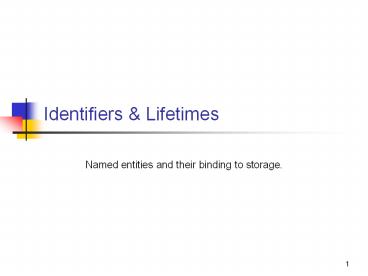Identifiers PowerPoint PPT Presentation
Title: Identifiers
1
Identifiers Lifetimes
- Named entities and their binding to storage.
2
Use of Identifiers
- What parts of a program have identifiers
("names")? - variables
- constants
- subprograms
- labels
- formal parameters
- classes
- whole programs?
const int BUFSIZE 1024 static long total long
count( int value ) sum while(valuegt0)
total value-- return total
3
Naming of Identifiers
- Do identifier names need to unique?
- depends on scope of identifier, and
- syntax of language use must be unambiguous
- Can an identifier use the name of a keyword?
- yes, in some (older) languages
- in current language design, keywords are reserved
for clarity
( In Pascal, identifier can be a keyword
) var integer real real integer begin real
2 3 ( integer arithmetic )
4
What kind of identifier is "A"?
(Java) Is the meaning of each identifier
unambiguous?
- class A / Stop waste! Conserve letters. /
- A A
- A ( )
- A (A A) this.A A
- A A ( ) return A
- A A (A A)
- A if ( A.A( ) A ) return A
- else break A
- return this.A
- public static void main(String a)
- A A new A( )
- A.A new A( A.A( A.A( ) ) )
0 1 2 3 4 5 6 7 8 9 10 11 12 13 14
5
Lifetime
- Lifetime is the duration of time that an entity
(variable, constant, ...) is bound to memory. - Lifetime can be...
- duration of process execution (static variables)
- duration of object existence (object attributes)
- duration of function activation (local variables)
- duration of scope activation (variable defined in
a scope). A function also defines a scope. - Lifetime applies to entities that have values,
not names. - "Lifetime of an identifier" doesn't make sense...
identifiers have "scope" rather than "lifetime".
6
Lifetime and Scope
- Scope of identifiers and lifetime of entity it
refers to are not the same. - Lifetime time when entity exists in memory
- scope the parts of a program where a name is
known or "visible"
void add( int count ) static long SUM
0 float x 0.5 while(countgt0) int x
2 SUM xcount count-- printf("f",
x)
count scope is function add( ), lifetime
unknown. SUM scope is function body, lifetime is
process execution time. float x scope is part of
the function excluding while loop, lifetime is
function activation time. int x scope is while
loop, lifetime is duration of while loop.
7
Lifetime and Scope (2)
- BUFSIZE has global scope (any file in this
program can refer to its value). Its lifetime is
the process's lifetime. - buf has file scope. Its lifetime is the
program's lifetime. - length , k scope is the function, lifetime is
duration of function. - c scope is the for loop. Life is duration of
"for" loop execution.
int BUFSIZE 1024 static char
bufBUFSIZE void read( int length ) int
k for(k0 kltlength k) int c
getchar() if (clt0) break bufk
c bufk '\0'
8
Constants
- C "const" can be compile time, load time, or run
time constants - const int MaxSize 80 / compile time
/ - void mysub( const int n )
- static const NUMBER 8sizeof(int)
- const time_t now time(0) / dynamic /
- const int LastN n / dynamic /
- In Java, "final" merely means a variable cannot
be changed after the first assignment. - final InputStream in System.in
- void mysub ( int n )
- final int LastN n
9
Types of Constants
- There are several classes of constants, depending
on when their value is known - compile time value can be computed at compile
time, includes - manifest constants (literals) const int MAX
1024 - computable expressions const int MAXBYTES
8MAX - elaboration time value is determined when the
program is executed. - sometimes this simply means a variable whose
value cannot be changed (this is enforced by the
compiler).

